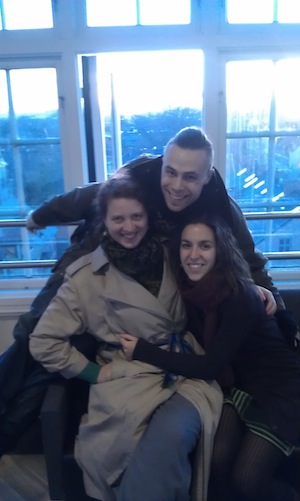Report from PhD course in Lund
Form the 2 to the 7 December, three of the PhD students at the KTH Environmental Humanities Laboratory (EHL), , and Anna Svensson, participated in the course “Situating the Environmental Humanities”, organized by LUCID and LUCSUS , at Lund University. The course aimed at discussing the newest development of Environmental Humanities in discussion with several humanist disciplines as well as PhD-students from a variety of faculties.
As members of the EHL, Anna, Isabel and Johan had frequently discussed what the Environmental Humanities is, in terms of aims, theoretical foundations, methodological approach to research and the importance of outreach regarding results. Safe to say, after a week of intense discussions nearly every rock had been turned and the environment we had travelled through on our way there had dramatically changed by the time we returned home.

The week began with sunshine and the joys of the picturesque atmosphere present in the student city of Lund. As things progressed, the skies turned darker with clouds, rain and hail, as the presentations contained increasingly worrying descriptions of the state of the world. The points we kept returning to were the potentials Environmental Humanities present to us at this stage in history, a new sense of meaning for the Humanities at large, and the increasingly pressing need for understanding humans and society as global changes unravel. By the time we said our goodbyes, the storm Sven/Xaver was upon us and although climate change inflicts a “slow violence” (to borrow Rob Nixon’s term), singular events do carry an air of urgency with them. We left with a feeling that it was time to get to work.
Having established the poetics and parables of this topic, let’s account for some of the points of the course “Situating the Environmental Humanities” and what we brought back. As has been suggested, there were a variety of fields presenting their own take on Environmental Humanities: animal studies, media studies, STS-studies of ecomodern utopias, (visual) ecocriticism and human ecology. Added to this there was a workshop on creative writing, dealing with different ways of addressing one’s research: both in formal and informal registers.
Coming from somewhat different disciplines ourselves, it was easy to spot the need for discussing common aspects around which the Humanities could rally in order to address environmental issues.
One of the most challenging parts of the week was having dinner with our teachers and fellow students. On this occasion, we were asked to find commonalities between our own research and that of our table-mates. Drawing from this, the three table-groups would then construct a question, and hopefully also some answers, on what the Environmental Humanities should do in the coming years. Anna, Isabel and Johan were all in different groups, and contributed with their own suggestions to what is the central question and answers of the Environmental Humanities. Alas, we were not able to present a solution to the world’s problems, despite the dinner and discussions carrying on long into the night. Regardless, it got us thinking.
This process might precisely be the next step for the Environmental Humanities; allowing students the means to try out methodologically what Environmental Humanities means in practice. The pioneers of this field have established a foundation and visions for the future of research. But in order to find out the merit, for instance in activism, influencing policies and policy-makers, and writing creative papers collectively, it needs to be tried out with and by students, to face their critique and feedback. If we are able to convince those learning and working in the Humanities that the environmental aspect is the one component currently in need of extensive analysis, we will have come a long way in convincing the public, policy-makers and/or activists that this is a good idea also for them to take into consideration.
